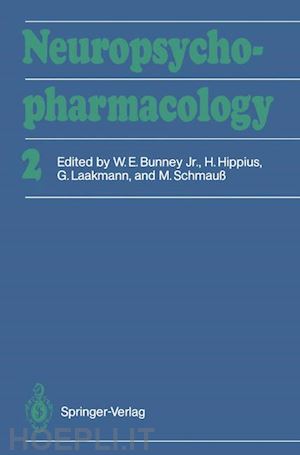1 Introduction.- Perspectives on Dopamine as a Regulator of Brain Function.- A View of Psychopharmacology, Neuroscience, and the Major Psychoses.- Lithium Is All Right, but … About Some Misconceptions and Some Recent Findings.- Improvement in the Quality of Sleep: A New Goal in Psychopharmacology.- The Future of Psychopharmacology and Positron Emission Tomography.- 2 Molecular Biology in Neuropsychopharmacology.- Molecular Biological Approaches to Brain Region- and Cell-Specific Molecules.- The ?1-Adrenergic Receptor as a Paradigm of Receptors Coupled to Guanine Nucleotide Binding Proteins.- The Alpha-2 Adrenoceptor Vulnerability Hypothesis of Depression: From the Clonidine Growth Hormone Stimulation Test to the Genes Encoding a Human Alpha-2 Adrenoceptor and Phenylethanolamine N-Methyltransferase.- 3 Molecular Biology in Neurology and Psychiatry.- Genetic Linkage Analysis in Early-Onset Familial Alzheimer’s Dementia.- Molecular Genetic Approach in Affective Illness.- Molecular Genetic Studies in Affective Disorders.- 4 Brain Transplants in Neurology and Psychiatry.- Long-Term Changes in Parkinson’s Disease Patients with Adrenal Medullary Autografts to the Caudate Nucleus.- 5 Peripheral Cells as Pharmacological Models in Psychiatric Research.- Lymphocyte Cholinergic Receptor Changes in Alzheimer’s Disease.- Increased Platelet Membrane Fluidity in Alzheimer’s Disease: An Initial Assessment of Specificity.- [3H] Spiperone Binding to Lymphocytes in Psychiatric Disorders.- Platelet Binding Sites for Serotonin Uptake Inhibitors: Is [3H]Imipramine Binding Decreased in Depression?.- Changes in Platelet Serotonergic and Adrenergic Function in Patients with Depression, Panic Attack, and Mania.- Platelet Monoamine Receptor Binding and Tricyclic Antidepressant Treatment.- 6 Endogenous Ligands for Psychotropic Drug Receptors.- Endogenous Opioids and Motivational Processes: Examination of the Neural Substrates Mediating Opioid-Induced Reward and Aversion.- 7 Biological Markers of Affective Disorders: Impact of Basic Neuroendocrine and Sleep Research.- Sleep-Physiological Characteristics as Potential Biological Markers in Affective Disorders.- Experimental Approaches for Testing the Cholinergic-Noradrenergic Imbalance Hypothesis of Affective Disorders.- Cortisol Response to Corticotropin Releasing Hormone in Dexamethasone-Pretreated Patients with Depression.- Differential Effects and Receptors of Corticosteroids in the Brain: Implications for Psychopathophysiology.- Neuropeptides and Affective Disorder.- Molecular Mechanisms Controlling Proopiomelanocortin Gene Expression.- 8 ?-Adrenoreceptors in Depression and for Antidepressant Effect.- Antidepressant Drugs Given Repeatedly and ?1-Adrenoceptors.- The Effect of Phenylethanolamine-N-Methyltransferase Inhibitor on Locomotor Activity in Rats: The Role of Central ?2-Adrenoceptor and PNMT Activity.- Neuroendocrine Studies of ?2-Adrenoceptor Function and the Mechanism of Action of Antidepressant Drugs.- Levoprotiline: Clinical Therapeutic Efficacy and Tolerability.- ?2-Adrenoceptor Interaction with Opiate Receptors.- Influence of Psychotropic Drugs on Pituitary Hormone Secretion with Special Reference to Norepinephrine Reuptake Inhibition.- 9 The Thyroid Axis in Basic and Clinical Research.- The TRH Test in Psychiatric Disorders.- The Blunted TSH Response to TRH — What Does it Tell Us? Biological Monitoring During Psychopharmacological Treatment.- Alcoholism and the Thyroid Axis.- Marginal Hypothyroidism in Mental Illness: Preliminary Assessments of Prevalence and Significance.- Antithyroid Antibodies: Behavioral Significance.- The Simultaneous Use of Four Releasing Factors: Theoretical and Practical Issues.- 10 PET Imaging in Neurosciences and Psychiatry.- Strategies for In Vivo Quantification of Human Neuroreceptors by Positron Emission Tomography.- Positron Emission Tomography with [18F]Deoxyglucose and Topographic EEG in Schizophrenia.- PET Imaging of D2 Receptors in the Living Baboon and Human Brain in Normal and Pathological Conditions Using [76Br]Bromolisuride.- Dopamine Metabolism in Brain Studied with PET.- 11 The Brain-Immune System Interactions.- Activation of Human Monocytes by the Neuropeptide Substance P and by Immune Interferon-?: Evidence of Different Mechanisms.- Neuroimmunomodulation: Electrophysiological Patterns in Brain During the Course of Immune Responses.- Sympathetic Noradrenergic Neural Contacts with Lymphocytes and Macrophages in the Splenic White Pulp of the Rat: Site of Possible Bidirectional Communication and Local Regulation Between the Nervous and Immune Systems.- 12 Neuropeptides: Basic Research.- Gene Expression of Opioid Peptides is Regulated by Electrical Activity.- Biosynthesis of Opioid Peptides.- Modulation of Energy Metabolism by Vasoactive Intestinal Peptide, Adenosine, and K+ in the Cerebral Cortex: Focus on the Cellular Level.- How Neuropeptides Alter Neuronal Excitability.- 13 Clinical Aspects of Neuropeptide Research.- Corticotropin Releasing Factor, the Amygdaloid Complex, and Depression: A Hypothetical Interrelationship.- Clinical Aspects of Neuropeptide Research.- Thyroid Axis Stimulation Tests in Psychiatry.- Corticotropin-Releasing Hormone and the Proopiomelanocortin-Derived Peptides in Depression.- Alterations in Neuropeptide Systems in Alzheimer’s Disease.- Endocrine Response to Tricyclic Antidepressants and Peptides in Depression with Special Regard to Growth Hormone Secretion.- 14 Postmarketing Surveillance of Psychotropic Drugs.- Relative Toxicity of Antidepressants Using Reports Independent of Observer Bias.- Assessment of Drug Utilization and Adverse Drug Reactions in the Federal Republic of Germany.- Drug Surveillance in Psychiatric Patients in the Federal Republic of Germany.- Surveillance of Toxicity of Antidepressants.- A General Perspective of Post-Marketing Surveillance.- Surveillance of Adverse Drug Reactions in the United States.- 15 Pharmacological Aspects of Sleep and Sleep Disorders.- Sleep and Sleep Deprivation Studies in Patients with Premenstrual Depression.- Epidemiological Aspects of Insomnia Research.- Antidepressant Medication and Total Sleep Deprivation in Depressives.- Pharmacology of New Sleep-Improving Drugs.- 16 Drug Effects and Morphological Investigations in Human Postmortem Tissue.- Neurotransmitter Function in Post-Mortem Human Brain: An Overview.- Modulation of Cholinergic Activity in Alzheimer Brains by Potential Drugs.- Reduced Stimulated Adenylate Cyclase Activity in Postmortem Hippocampus of Demented Patients.- Molecular Neuropathology: The Study of Transmitter and Receptor Expression in Human Postmortem Materials by In Situ Hybridization and Receptor Autoradiography.- Further Cytoarchitectonic and Quantitative Studies in the Entorhinal Region of Schizophrenics and Normal Controls by Means of a Modified Nissl Technique.- The Dopaminergic and Glutamatergic Systems in Schizophrenia.- 17 AIDS.- Peptide Intervention in Neuronal Death Caused by the HIV External Envelope Protein: Clinical Implications.- AIDS as a Neuropeptide Disorder: Does HIV Bind to a VIP Receptor?.- Neuropsychiatry of AIDS: Clinical Presentation and Treatment Research.- Psychiatric Symptoms and Neuropsychological Deficits in HIV Infection.











